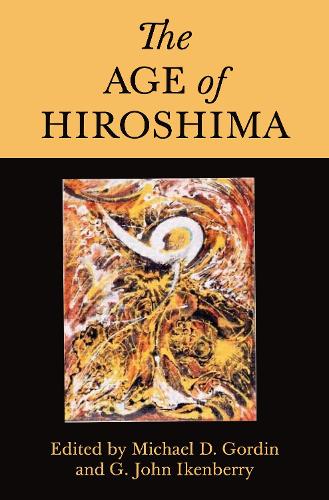
The Age of Hiroshima
(Paperback)
Available Formats
Publishing Details
The Age of Hiroshima
By (Author) Professor Michael D. Gordin
Edited by G. John Ikenberry
Contributions by Campbell Craig
Contributions by Alex Wellerstein
Contributions by Sean L. Malloy
Contributions by David Holloway
Contributions by Takuya Sasaki
Contributions by Shinsuke Tomotsugu
Contributions by Srinath Raghavan
Contributions by Wakana Mukai
Princeton University Press
Princeton University Press
24th March 2020
United States
Classifications
Tertiary Education
Non Fiction
Military history: post-WW2 conflicts
International relations
Modern warfare
Nuclear weapons
940.542521954
Physical Properties
Paperback
448
Width 156mm, Height 235mm
Description
A multifaceted portrait of the Hiroshima bombing and its many legacies On August 6, 1945, in the waning days of World War II, the United States dropped an atomic bomb on the Japanese city of Hiroshima. The city's destruction stands as a powerful symbol of nuclear annihilation, but it has also shaped how we think about war and peace, the past and
Reviews
"The Age of Hiroshima is a unique and innovative collection of original articles that together brilliantly make the point that the atomic bombings of Hiroshima and Nagasaki created a new international order with new dangers and new ways of thinking. There is no better text to help students understand the profound influence of nuclear weapons on the global environment. It should be required reading in every history and political science curriculum."Martin J. Sherwin, Pulitzer Prizewinning historian, author of A World Destroyed: Hiroshima and Its Legacies
"This important book deftly examines the wide range of meanings attached to the atomic destruction of Hiroshima in August 1945. Gordin and Ikenberry bring together some of the very best scholars writing about nuclear weapons and nuclear energy today."Scott D. Sagan, author of The Limits of Safety: Organizations, Accidents, and Nuclear Weapons
"This impressively broad and richly interdisciplinary book explores the evolving legacies of Hiroshima across the globe and over time. It is essential reading for those who study our nuclear past, present, and future."Elizabeth N. Saunders, Georgetown University
Author Bio
Michael D. Gordin is the Rosengarten Professor of Modern and Contemporary History at Princeton University. His books include Five Days in August: How World War II Became a Nuclear War (Princeton). G. John Ikenberry is the Albert G. Milbank Professor of Politics and International Affairs at Princeton and a Global Eminence Scholar at Kyung Hee University in Seoul, South Korea. His books include Liberal Leviathan: The Origins, Crisis, and Transformation of the American World Order (Princeton).
